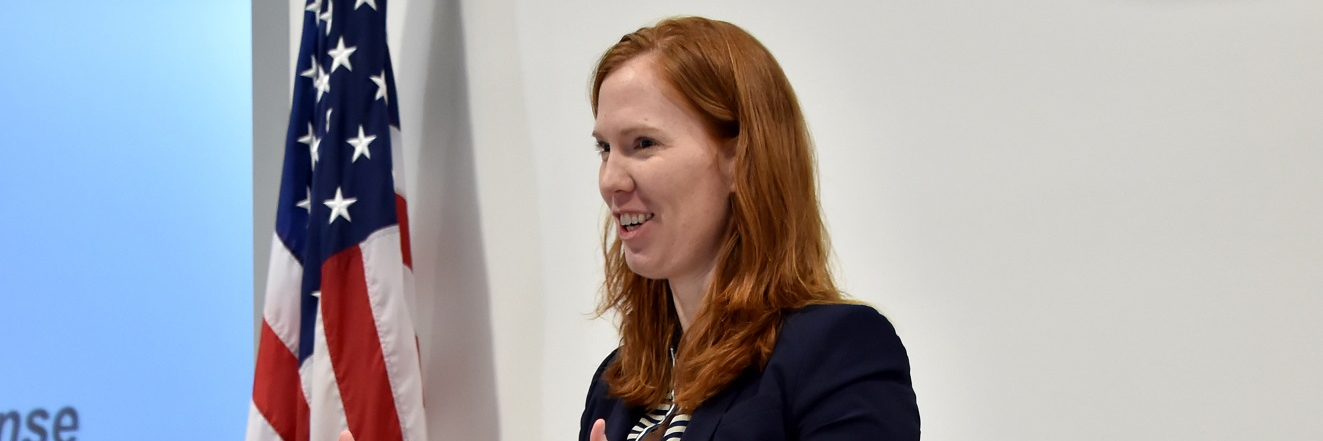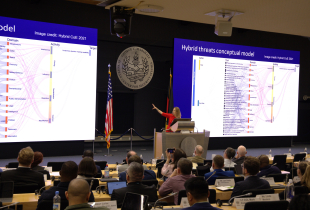
Marshall Center Cyber Security Studies Program Bolsters Next Generation of Defenders
By James Brooks
Public Affairs Office
George C. Marshall European Center for Security Studies
GARMISCH PARTENKIRCHEN, Germany (Feb. 21, 2017) - Cyber security professionals from around the world returned home Feb. 16, with fresh perspectives and a renewed sense urgency after working and learning together during the Program on Cyber Security Studies at the George C. Marshall European Center for Security Studies.
U.S. Department of Defense Principal Director for Cyber Policy Kate Charlet outlines department cyber priorities at the George C. Marshall European Center for Security Studies' Cyber Security Studies Program, Feb. 16.
The two-and-a-half week long course, designed to build global cyber security capacity through understanding and formulating strategies, attracted 76 military and civilian cyber practitioners from 55 nations.
The two-and-a-half week long course, designed to build global cyber security capacity through understanding and formulating strategies, attracted 76 military and civilian cyber practitioners from 55 nations.
PCSS was launched three years ago to fill a specific gap in the cyber security realm. While many cyber classes focus on the technical aspects, the bits and bytes of computer networks, the Marshall Center program focuses on the dimensions government and military leaders navigate when devising national regulations and agreements involving modern-day networked communities.
“In two and a half weeks, it’s difficult for us to cover every topic with sufficient depth, skill and expertise but getting the right themes for what we need to consider in our professional duties is important. I think the participants and guest speakers recognize this is a difficult challenge to do,” said PCSS Program Director Phil Lark. “We are blessed to have a unique model that absolutely works. That model represents the expertise of serving professionals, private industry leaders, and political leadership. This balance of expertise and the ability of our participants’ ability to interact with everyone is what is important. I want this course to form a team of professionals that really want to help each other and share after they leave here. “
Industry, government and academic experts in the cyber realm are an important part of the PCSS program. Guest speakers are invited not only for what they know but also for the accessibility and willingness to spend time, one-on-one, with participants looking for answers to their national cyber security concerns. But this professional exchange of ideas works both ways.
Kerstin Vignard from the United Nations Institute for Disarmament Research in Geneva, Switzerland, gave a presentation on the United Nations Group of Government Experts and how cyber security implications are discussed on that global stage. In return, she got much more.
“In today’s world, courses like this one are essential for capacity building and networking. PCSS is also useful to find common ground and understanding between very diverse cultures, political positions and ideologies which are causing impediments to international agreements on cyber issues,” Vignard said.
“This has been a great opportunity to meet practitioners from countries I don’t normally come across. There are many participants from ministries of defense who I seldom get to meet in the United Nations framework. This is exactly the place where I want to spend my time,” she added.
According to Lark, a successful cyber discussion must take place with the people who are dealing with it on a daily basis in their respective nations. The participants who attend PCSS are already hard at work wrestling with cyber processes, policies and laws back home.
One of the participants in this PCSS class traveled thousands of miles from his home in Kenya, Africa. Lt. Col. Robert Koome is the chief of section of the communications department in the ministry of defense, there. PCSS was the right course to help him focus on his realities and to start formulating a plan of action.
“We have a lot that we need to do within our institutional framework. First, we don’t have the capability of combatting the threat. We need to come up with a policy. Especially the awareness, and the training of our people so they can get to know what is ‘cyber’ and how they can combat the menace,” he said. “The significance of a course like this is that it has brought professional experts together. I think this is a good idea to share information, come together and look at our common problems and see possible solutions to tackle the common problem.”
For other participants, PCSS is an important first step to becoming a successful cyber practitioner in greater leadership assignments. Last April, Germany announced plans to establish a dedicated “cyber information command in its armed forces. German Navy Commander Markus Lohmann is one of the military officers transferring to this fledgling organization. Besides a better understanding of cyber security, he now possess a long list of international partners and friends he can rely on for help.
“This course changed many of my perspectives and points of view on cyber security. Two areas that really changed my opinion was protecting critical infrastructure and the need for public-private partnerships. The expertise of the participants from all over the world gives me the opportunity to contact them,” said Lohmann.
The final guest speaker traveled from Washington, DC to stress the importance of the tasks that face these cyber practitioners when they leave the PCSS program. Principal Director for Cyber Policy within the U.S. Department of Defense Kate Charlet said cyber security is no longer a niche area with “geeks and nerds” stereotypes. It’s a new world that demands experts who understand the issue and can make tough decisions.
“I can’t stress how important it is to build this community. Learn from this community and partner together because that’s what policy makers need to understand, Charlet told the participants. “We all have to learn this together and build the next generation of professionals. Everything we are doing today--and this PCSS event--is critical. We are going to rely on each other and that’s more important than ever.”
The Marshall Center’s next PCSS course is scheduled for December. But don’t expect it to be a digitally mastered reproduction of this program or the previous two.
“The nature of the cyber threat and risks, the nature of the wickedly complex problems require adaptive changes to old methods and old styles. The PCSS course today will not be anything like the PCSS we give in December. The themes may be the same but the content will be different,” Lark said.
